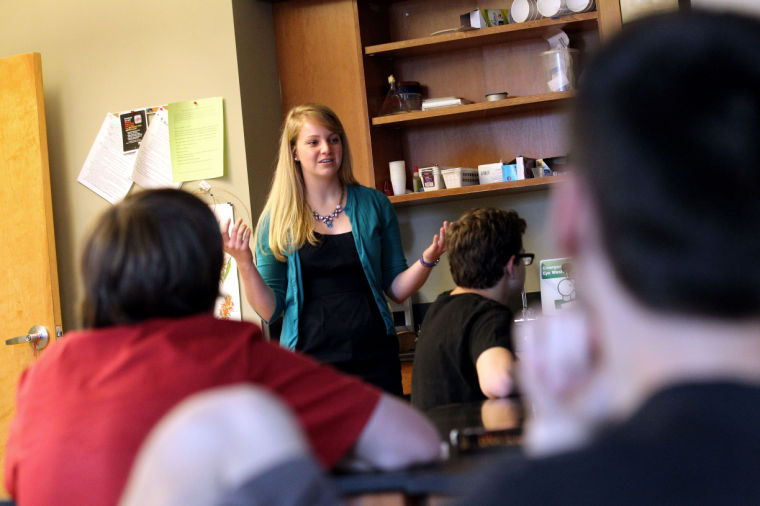Team:Virginia/Outreach
From 2013.igem.org
Although iGEM, High School Division, has grown phenomenally since its 2011 introduction, we hope to inspire development of more high school teams through collegiate-high school partnerships. With innovative workshops introducing synthetic biology and the iGEM competition, we plan to foster scientific discovery and enthusiasm while also increasing high school iGEM participation. Our comprehensive, 6-workshop curriculum may be instituted anywhere, by any iGEM team, to encourage a passion for science and to facilitate development of a high school iGEM team. Spanning topics from basic DNA structure to the bioethical implications of synthetic biology, our instruction includes PowerPoint presentations, interactive activities, laboratory investigations, class discussions, and recommended readings.

To develop our extensive curriculum, we partnered with Renaissance School, a local high school in downtown Charlottesville. Using Renaissance as a prototype for curriculum development, we conducted pre-assessment surveys to analyze students’ impressions of synthetic biology, tailoring our curriculum to their interests and needs. The large majority of students were unable to define recombinant DNA, transgenic organisms, and synthetic biology, nor were they familiar with common laboratory techniques including PCR, restriction enzyme digestion, and gel electrophoresis. This lack of knowledge reflects the general public’s poor knowledge of synthetic biology, and we believe that our education series will help remedy this problem. Introducing youth to the many applications and implications of science ultimately makes them more educated and informed adults long term, while also spreading the knowledge short term as they discuss what they learn with family and friends. As synthetic biology increasingly encounters bioethical implications requiring input from the public at large, such a basic public understanding becomes quite important.

Although our programming will extend throughout the entire semester, the students have expressed nothing but positive feedback so far. Through our instruction they have already developed a firm understanding of DNA structure and BioBrick construction; ultimately, the school was so excited about our programming that they even developed a DNA Science class to accompany our instruction. We plan to introduce the students to our lab space later in the semester, and by the spring we plan to have developed a Renaissance iGEM team for the Spring 2014 competition. Once completed, we will assess the efficacy of our instruction through post-assessment surveys strongly resembling the original pre-assessments.
Please find our workshop curriculum outlined below; for further information, view the linked syllabus. Specific documents for instruction may also be found attached to the links below (note that document numbering corresponds to workshop numbering). Instructor notes are provided as a reference for PowerPoint presentations; curriculum may be adjusted appropriately for each particular student audience.
- Workshop #1: DNA Structure, Transcription, & Translation
- Workshop #2: Genes, Backbones, & BioBrick Structure
- Workshop #3: Restriction Enzyme Digests, Ligation Reactions, & Gibson Assembly
- Workshop #4: PCR, Gel Electrophoresis, & Transformation
- Workshop #5: Synthetic Biology & iGEM
- Workshop #6: Human Practices & Bioethical Considerations
Powerpoint Presentations
- DNA Structure, Transcription, & Translation---Instructor Notes
- Genes, Backbones, & BioBrick Structure ---Instructor Notes
- Restriction Enzyme Digests, Ligation Reactions, & Gibson Assembly ---Instructor Notes
- PCR, Gel Electrophoresis, & Transformation---Instructor Notes
Interactive Activities and Laboratory Investigations
- Edible DNA
- DNA Extraction
- Design Your Own BioBrick (Exploring the Parts Registry)
- Make Your Own Primers
Class Discussion Questions
Recommended Readings
- 3-Enzymatic Assembly of DNA Molecules up to Several Hundred Kilobases, Gibson, et. al.
- 5.1-Building Outside of the Box, iGEM and the BioBricks Foundation, Christina Smolke
- 5.2-Five Hard Truths of Synthetic Biology, Roberta Kwok
- 6.1-Horizontal Gene Transfer as a Biosafety Issue- A Natural Phenomenon of Public Concern, Droge, et al.
- 6.2-What’s at Stake in the Supreme Court Decision in ‘AMP v. Myriad Genetics,’ Rose-Ellen Lessy
- Online

 "
"
